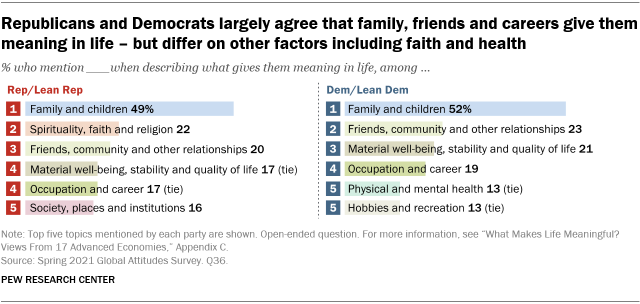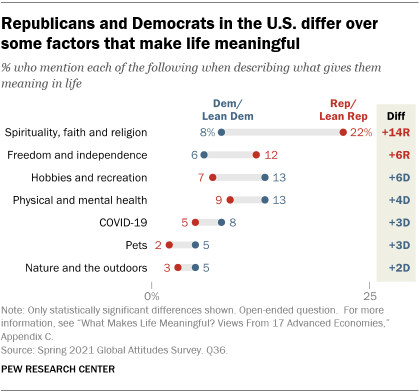In the United States, even the meaning of life can have a partisan tinge.
In February 2021, Pew Research Center asked 2,596 U.S. adults the following open-ended question: “What about your life do you currently find meaningful, fulfilling or satisfying? What keeps you going and why?” Researchers then evaluated the answers and grouped them into the most commonly mentioned categories.
Both Republicans and Democrats are most likely to say they derive meaning from their families, and they also commonly mention their friends, careers and material well-being. But Republicans and Democrats differ substantially over several other factors, including faith, freedom, health and hobbies.

In fact, even some of the words that partisans use to describe where they draw meaning in life differ substantially. Republicans, along with independents who lean to the Republican Party, are much more likely than Democrats and Democratic-leaning independents to mention words like “God,” “freedom,” “country,” and “religion.” Democrats are much more likely than Republicans to mention words like “new,” “dog,” “reading,” “outside,” “daughter” and “nature.” (Democrats are most likely to mention “new” in the context of learning something new. But some also mention it in the context of new experiences, meeting new people or other forms of exploration.)
Below, we explore these partisan differences in more detail and look at how attitudes in the United States compare internationally, based on surveys conducted among 16 other publics in spring 2021.
Republicans are much more likely than Democrats to cite religion as a source of meaning in their life. People in both parties mention spirituality, faith and religion as a source of meaning, with specific references to participating in traditional religious practices, as well as more general references to living a life informed by faith. One Republican woman, for example, said, “My faith and the ability to choose to be thankful, optimistic and joyful are what keeps me going.”

Overall, though, around one-in-five Republicans and Republican-leaning independents (22%) say spirituality, faith or religion gives them meaning in life, compared with only 8% of Democrats and those who lean to the party. Evangelical Protestants – a heavily Republican group – are especially likely to mention faith and religion as a source of meaning (34%). Smaller shares do so in other religious groups, including those following the historically Black Protestant tradition (18%), mainline Protestants (13%), Catholics (11%) and those who describe themselves as atheist, agnostic or “nothing in particular” (2%).
Republicans are also particularly likely to mention God.
Republicans are more likely than Democrats (12% vs. 6%) to bring up freedom and independence as something that gives their life meaning. Some people mention freedom in the personal sense, focusing on their ability to live the way they want, their work-life balance, or having or wanting free time. One Republican woman said, “I like being able to have the freedoms to make my own decisions and to be able to contribute to my country. Being able to express my views without worrying about retribution.”
Others emphasize freedom in a more political sense, highlighting things like freedom of speech and religion. One Republican man had this to say: “Keeping the true meaning of being an American, country first, defending the Constitution and freedom of speech.”
Democrats are more likely than Republicans to cite physical and mental health as part of what gives them meaning in life – and they mention the COVID-19 pandemic more frequently. When the survey was fielded in February, some 13% of Democrats and 9% of Republicans mentioned health – whether people’s current state of well-being, their exercise regimens or the steps they take to lead healthy lives. For some, health is also a precursor for other sources of meaning. One Democratic man put it this way: “The biggest thing for me is health. If you don’t have your health you don’t have much. Everything else can come later but you have to have your health.”
One-in-five Americans who mentioned health also mentioned the COVID-19 pandemic, including 23% of Democrats and 17% of Republicans. And while Democrats and Republicans were about equally likely to mention COVID-19 in the context of difficulties or challenges they faced, the specifics varied by party. One Republican woman, for example, said, “My family is my only driving force. Being forced into a yearlong quarantine isn’t making that easy.” On the other hand, a Democratic woman said, “Though COVID is a constant worry, I have faith we will come through eventually and that President Biden will be able to unite our country.”
Democrats were also much more likely than Republicans to mention COVID-19 in the context of the country and where they live (23% vs. 6%) – suggesting that for Democrats, the pandemic has more of a societal dimension than for Republicans.
Democrats are more likely than Republicans to find meaning in hobbies and recreation, nature and the outdoors, and pets – though small shares of Americans overall mention these things. Overall, only one-in-ten Americans say hobbies are a source of meaning in their life, and even fewer say the same about nature (4%) or pets (3%). But Democrats are about twice as likely as Republicans to cite each one as a source of meaning in their life. Among Democrats, liberals are more likely than moderates and conservatives to find meaning in hobbies, nature and pets, but there are few ideological differences among Republicans on these topics.
Conservative Republicans are particularly likely to mention their country or where they live as a source of meaning. Among Republicans, 16% mention the country, patriotic and national sentiments, or the state of America’s economy or society as a source of meaning, compared with 12% of Democrats. But conservative Republicans (21%) are particularly likely to mention society relative to moderate and liberal Republicans (9%), while there are no major ideological differences among Democrats.
One Republican man offered a short and simple description of what gives him meaning in life: “Being born in America.” And one Republican woman said, “I am first-generation American and I think it is the greatest country in the world, and I am very grateful to live here.”